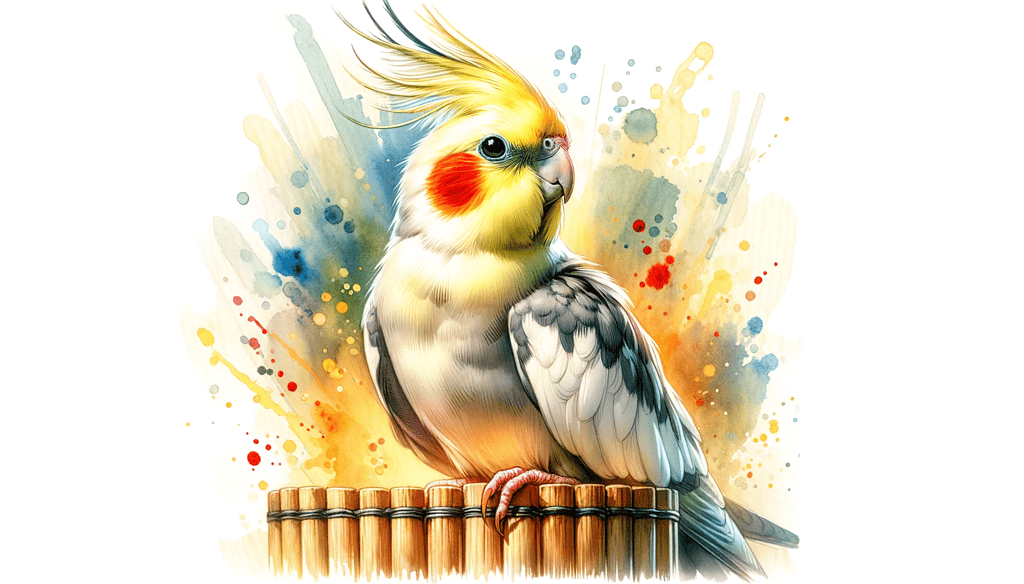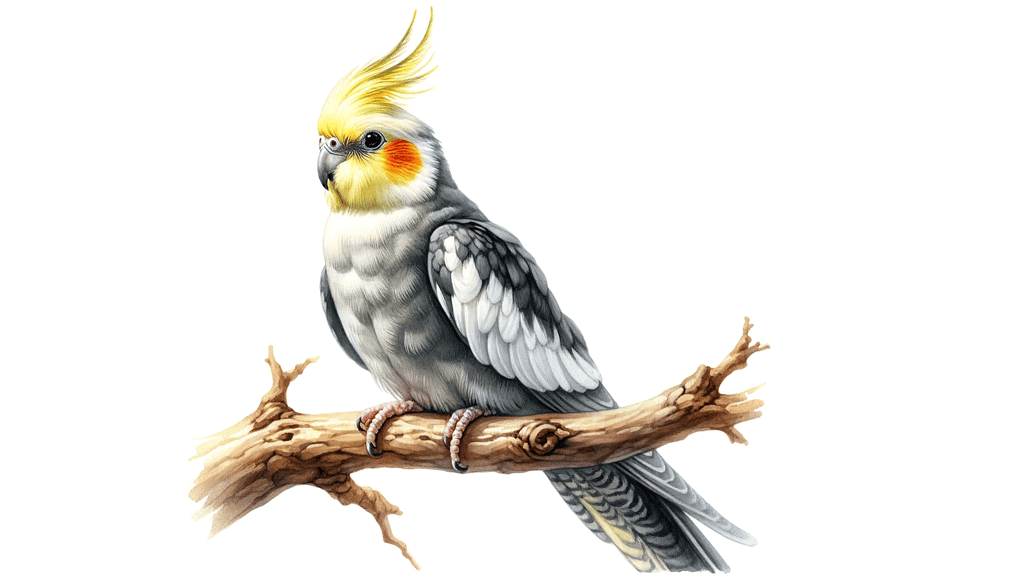
When it comes to our feathered companions, particularly cockatiels, understanding their eating habits can seem like a bit of a mystery. How often have you watched your cockatiel munching away and wondered, “Do they really know when to stop?” It’s a question I’ve heard countless times in my experience.
As a general rule, cockatiels have a natural instinct to stop eating when they’re full. However, in captivity, various factors like diet, environment, and health can influence their eating habits, sometimes leading them to overeat.
If you’ve ever been curious about the nuances of a cockatiel’s diet, or if you’re seeking insights on how to ensure your feathery friend’s health, stick around. There’s a wealth of information ahead that I believe you’ll find invaluable.
Are Cockatiels Prone To Overeating?
Yes, cockatiels, like many other pet birds, can be prone to overeating, especially when kept in captivity. In the wild, these birds spend a significant amount of time foraging, which keeps them active and regulates their food intake. In domestic settings, a lack of physical activity combined with constant access to food can result in overconsumption. Offering high-fat or sugary treats can exacerbate the problem. It’s essential for owners to monitor their cockatiel’s diet and ensure they receive balanced nutrition to prevent obesity and related health issues.
Factors Influencing Overeating In Cockatiels
But why would a cockatiel overeat? A variety of factors come into play:
1. The Impact Of Constant Food Availability
In a domestic setting, one primary reason cockatiels might overeat is the constant availability of food. When food is always at hand, natural cues that signal them to stop eating can get overridden. Ensuring you measure out their daily food portions promotes healthier eating habits rather than withholding food.
2. The Role Of Boredom In Overeating
Boredom is another significant contributor to overeating. Similar to humans, birds might turn to food when they lack stimulation. Keeping a cockatiel mentally engaged with toys, puzzles, and regular interaction prevents them from overindulging, as an active mind often means a contented bird.
3. Dietary Imbalances
Offering only one type of food can lead to overconsumption as cockatiels may try to get all their required nutrients. It’s essential to provide a diverse diet, rotating different foods, and including fresh fruits, vegetables, and suitable treats.
4. Health Concerns And Overeating
Sometimes, overeating is a symptom of underlying health issues or nutritional deficiencies. Should you notice a sudden change in appetite, it’s a cue to consult with a veterinarian to ensure the health and well-being of your bird.
5. Emotional Eating
Yes, even birds can emotionally eat! Stress or anxiety might lead a cockatiel to consume more than usual. By creating a calm environment and fostering regular interactions and training, you can build trust and reduce stress, encouraging a healthier relationship with food.
Signs That Your Cockatiel May Be Overeating
Having explored the eating habits of cockatiels and the environments influencing their diet, let’s delve into how you can spot if your beloved feathered friend might be indulging a tad too much. Recognizing these signs early on is the key to ensuring their optimal health.
1. Physical Indicators
Now, overeating can often lead to visible physical changes. If you’re like most dedicated bird owners I’ve met, you probably already have an instinctual sense when something’s amiss. Here are some crucial physical signs to watch out for:
- Weight Gain: Regularly weighing your cockatiel can help detect even minor fluctuations in weight. An unexpected increase could be an indicator.
- Feather Discoloration or Loss: While molt is natural, an excessive loss or change in feather color can indicate dietary issues.
- Distended Abdomen: A swollen or protruding belly area is not a typical trait for a healthy cockatiel and may signal overeating.
- Decreased Mobility: Difficulty in flying, climbing, or general lethargy can be linked to excessive weight gain.
- Labored Breathing: If you notice your bird breathing heavily after minimal activity, it might be a result of increased body weight putting strain on its respiratory system.
2. Behavioral Indicators
Physical signs, while crucial, are only half of the story. Behavioral changes can be just as telling. Here’s what you should keep an eye out for:
- Food Guarding: If your cockatiel suddenly becomes overly possessive or aggressive around their food, it might be a hint.
- Frequent Eating: Occasional snacking is typical, but if they’re at the food dish every time you glance their way, there might be an issue.
- Decreased Playtime: A drop in their usual playfulness or reluctance to come out of the cage can be associated with feeling heavier or lazier due to overeating.
- Changes in Droppings: Increased food intake will invariably lead to changes in the frequency, consistency, and appearance of their droppings.
- Lack of Interest in Toys or Activities: If your usually spirited cockatiel starts showing disinterest in their favorite toys or activities, it could be tied to their eating habits.
Tips To Regulate Your Cockatiel’s Eating Habits

After understanding the signs of overeating, it’s essential to arm yourself with actionable steps to ensure your cockatiel’s dietary habits are on track. Let’s dive into some tried-and-true methods I’ve come across in my years of practice.
1. Balanced Diet
Every cockatiel’s foundation for good health starts with a balanced diet. Here’s a straightforward table to help you make the right food choices for your feathery friend:
| Food Type | Quantity | Frequency |
| Seeds (like millet) | 1-2 teaspoons | Daily |
| Fresh Veggies | 1/4 cup | Every 2 days |
| Fresh Fruits | 1/8 cup | Twice a week |
| Pellets | 1-2 teaspoons | Daily |
| Cuttlebone | 1 piece | Always available for nibbling |
Remember, it’s crucial to avoid giving them anything toxic, like chocolate or avocado, which can be harmful.
2. Enrichment Activities
Stimulation is key! Just as you and I might munch out of boredom, cockatiels do the same. Here are some activities to keep them entertained:
- Foraging Toys: These toys make your bird work a little to get their food, mimicking the natural act of searching for food.
- Interactive Toys: Toys that require problem-solving can keep their minds sharp and engaged.
- Mirrors: Many birds enjoy the company of their own reflection. It’s like having a chat with a buddy.
- Swings and Ladders: These can provide both physical exercise and entertainment.
- Music or TV: Some cockatiels enjoy a bit of background noise. It’s fascinating to see them chirp along!
3. Regular Health Check-Ups
Consistent check-ups with a vet are more than just a safety measure. Here’s why they are indispensable:
- Detect issues early before they become more severe problems.
- Monitor weight and dietary habits accurately.
- Stay updated on dietary needs, which can change as your bird ages.
- Ensure that any changes in behavior or appearance are addressed.
- Peace of mind for you, knowing your feathered companion is in good health.
Conclusion
Understanding our feathery friends’ eating habits is crucial to ensuring their well-being. So, when we ask, “Do cockatiels know when to stop eating?” the answer isn’t straightforward. Various factors, from food availability to emotions, can influence their eating behavior. It’s our duty as bird enthusiasts and caregivers to be observant and provide a balanced, engaging environment for them.
Did you find this insight helpful? We’d love to hear your thoughts below. If this article shed some light on your cockatiel’s eating habits, please share it with fellow bird lovers. Your voice can help others offer the best care for their winged companions!
Frequently Asked Questions
What do cockatiels eat in the wild?
In their natural habitats, cockatiels primarily feed on seeds, particularly from native Australian grasses. They also consume fruits, berries, and occasionally insects.
How often should a cockatiel eat?
Cockatiels should have access to a base diet of seeds or pellets daily, supplemented by fresh fruits and veggies. Offering meals twice a day, morning and evening, is common.
Can cockatiels eat human food?
Yes, cockatiels can enjoy some human foods, but moderation is key. Stick to fresh, unprocessed foods like fruits, veggies, and cooked grains. Always avoid toxic foods like chocolate, avocado, and caffeine.
Why is my cockatiel always hungry?
Constant hunger can be a behavioral trait or indicate an underlying health issue. Monitor their food intake, ensure a balanced diet, and consult a vet if the behavior persists.
